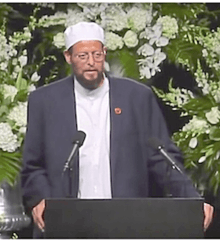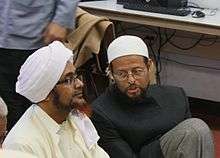Zaid Shakir
Imam Zaid Shakir (Arabic: زيد شاكر; born Ricky Daryl Mitchell, May 24, 1956)[1] is a Muslim American scholar [4][5][6][7][8][9][10][11] and co-founder of Zaytuna College[12][4] in Berkeley, California. He teaches courses on Arabic, law, history, and Islamic spirituality.
Zaid Shakir | |
|---|---|
 Imam Zaid Shakir presides over "The People's Champ" Muhammad Ali memorial service in Louisville, KY., 2016. | |
| Title | Imam |
| Personal | |
| Born | Ricky D. Mitchell May 24, 1956 [1] Berkeley, California, United States |
| Religion | Sunni Islam |
| Citizenship | United States |
| Era | Modern era |
| Jurisprudence | Shafi'i |
| Creed | Ashari |
| Main interest(s) | Islamic Law, International Relations, Political Science |
| Education | American University (B.A.), Rutgers University (M.A.)[2] |
| Occupation | Islamic Scholar, Author[3] |
| Senior posting | |
| Website | newislamicdirections |
He is co-founder and chairman of United For Change,[13] whose stated goal is to leverage the diversity of the Muslim and interfaith community and address divisive obstacles.[14] In 2015, he signed the official Memorandum of Understanding between Zaytuna College and Hartford Seminary in Connecticut.[15]
He is one of the signatories[16] of A Common Word Between Us and You, an open letter by Islamic scholars to Christian leaders, calling for peace and understanding.
Inspired to work with religious groups on sustainable living and climate change, he is a Green Faith[17] partner in action for the earth. The mission is to inspire, educate, organize, and mobilize people of diverse religious and spiritual backgrounds globally for environmental action.[18][19]
Imam Zaid is a signatory along with religious and spiritual Leaders from around the world who presented the UN Secretary General with a declaration[20] in support of the Paris Climate Agreement under the United Nations Framework Convention on Climate Change, marking the largest number of nations ever signing an international agreement.[21]
Early life
Shakir was born in 1956[5] in Berkeley, California as Ricky Daryl Mitchell to a family descended from African, Irish and Native American[6] roots. His formative years were spent in housing projects in New Britain Connecticut. These early experiences instilled in him a compassionate and realistic work ethic, as well as an unshakeable desire for social change and economic justice. He converted to Islam in 1977 while serving in the United States Air Force and shortly after changed his name to Zaid Salim Shakir.[6]
Education
A summa cum laude graduate, he obtained a BA in International Relations at American University in Washington, D.C., earned his MA in Political Science at Rutgers University.[22] He then left for Syria to pursue his studies in the traditional Islamic Sciences.[22] For seven years in Syria, and briefly in Morocco, he immersed himself in an intense study of Arabic, Islamic law, Quranic studies, and spirituality with some of the top Islamic scholars of our age, such as Sheikh ʿAbd al-Raḥmān al-Shāghūrī[23] and Sheikh Mustafa Al-Turkmani. In 2001, he was the first American male graduate from Syria's Abu Nour University[22] with a BA in Islamic Sciences.
Recent work in the United States
Zaytuna College
In 2003, as a scholar-in-residence at Zaytuna Institute located in California, Shakir began to teach Arabic, Law, and Islamic spirituality. In 2004, he initiated a pilot seminary program at Zaytuna Institute, which was useful in Zaytuna College’s refinement of its Islamic Studies curriculum and its educational philosophy. For four years, students in the pilot program were engaged in the study of contemporary and classical texts. And, in the fall of 2010, he and his colleagues Hamza Yusuf, and Hatem Bazian co-founded the Berkeley, California based Zaytuna College, a four-year Muslim liberal arts college, the first of its kind in the United States,[24] dedicated to "educate and prepare morally committed professional, intellectual, and spiritual leaders", who are grounded in the Islamic scholarly tradition and conversant with the cultural currents and critical ideas shaping modern society. In 2016, Zaytuna College became the first accredited Muslim campus in the United States after it received approval from the Western Association of Schools and Colleges.[25][26]
Views
As reported in The New York Times, Zaid Shakir appeared with nine other influential Muslim scholars in a YouTube video denouncing militant Islam.[27][28][29] The aftermath of 911 Shakir states, "People all over the world have felt the repercussions and the reprisals for the senseless brutality of 9/11’s perpetrators. Our best hope is to attempt to move beyond the pain, strife and hatred unleashed. Trusting in the power and promise of God we will be able to do just that." [30]
The Chronicle of Higher Education has praised him, stating, "Embodying an American story if ever there was one—including proverbial bootstraps, military service, political activism, and deep religious commitment—Zaid Shakir’s message of social justice in the face of poverty and racism he has known first hand makes him endlessly and, it often seems, effortlessly relevant. He is as approachable a man as I’ve ever met." [31]
Shakir states in Scapegoats: How Islamophobia Helps Our Enemies & Threatens Our Freedoms, “Sharia forbids members of a Muslim minority [in Western societies] from engaging in clandestine acts of violence and paramilitary organizing… or from acting as political or military agents for a Muslim-majority country. Islamic law also forbids the disruption of public safety, many of the practices that the average person fearfully associates with some Muslims today, like killing innocent people (non-Muslims and Muslims alike) and stoning women."[32]
Reception

The 500 Most Influential Muslims of the world edition 2020 describes Imam Zaid Shakir as "an influential Islamic scholar and a voice of conscience for American Muslims[33] and non-Muslims alike.", edited by John Esposito and Ibrahim Kalin[34]
Tikkun Daily states that he is "one of the most thoughtful and dynamic teachers about the true nature of Islam in America today".[35]
Imam Zaid was named in CNN's 2018 list of "25 Influential American Muslims", where he was described as "one of the West’s most respected Muslim scholars.”[36]
Publications
Books authored
Books translated with additions
Books which include his foreword or note
- Towards Sacred Activism, (wrote foreword), 2018
- Scapegoats: How Islamophobia Helps Our Enemies and Threatens Our Freedoms, (wrote endorsement), 2016
- Creation at the Crossroads, (contrib. article) Muslims and The Climate Crisis: Responding To A Higher Call, 2016
- Revelation: The Story of Muhammad, (wrote endorsement), 2015
- Tears Of The Yearners For The Meeting With God, (wrote foreword), 2015
- Green Deen: What Islam Teaches About Protecting the Planet, (editorial review), 2010
- Ascent to Felicity, (editorial review), 2010
- The War within Our Hearts: Struggles of the Muslim Youth, (wrote introduction), 2010
- Living With Blindness: Lessons from the Life of Imran Sabir, (wrote introduction), 2009
- Submission Faith and Beauty, The Religion of Islam (Co-edited with Hamza Yusef), 2008
- A Gathering of Voices on Caring For Creation, (contrib. article)The Zaytuna Ruku Tree, 2008
- Dear Self: A Year In The Life of A Welfare Mother, (wrote foreword), 2006
- The Empire and The Crescent, (contributed article) Jehad as Perpetual War), 2004
Books edited
- Joseph Lumbard, Submission, faith and beauty: the religion of Islam (2009). Co-edited with Hamza Yusuf.
Papers
- Where Islam and Nationalism Collide
- The Human in The Quran
- A Muslim Response to Pope Francis Laudato S’ - “Muslims and The Climate Crisis: Responding To A Higher Call”, (115 -119)
- Crescentwatch Position Change
- American Muslims, Human Rights, and the Challenge of September 11
- An Examination of The Issue of Female Prayer Worship
- Malcolm X (1925-1965)
- Islam, Prophet Muhammad, and Blackness
External links
| Wikimedia Commons has media related to Zaid Shakir. |
References
- The Muslim 500
- Haddad, Mattson (2008). An Examination of The Issue of Female Prayer Leadership. Columbia University Press. p. 239. ISBN 978-0231139571.
- "Bill Moyers Journal", https://www.pbs.org/moyers/journal/06222007/profile.html
- "Lonny Shavelson, Fred Setterberg", Under the Dragon: California's New Culture, Oakland Museum of California, Heyday Books, p.64, ISBN 978-1597140454
- Esposito, John (2009). The 500 Most Influential Muslims. Royal Islamic Strategic Studies Centre. p. 86. ISBN 978-9957-428-37-2.
- "Edward E. Curtis", The Columbia Sourcebook of Muslims in the United States, Columbia University Press, p.239, ISBN 9780231139571
- "Dallas News", http://www.dallasnews.com/news/metro/20150125-north-texas-muslims-neighbors-gather-to-call-for-peace.ece#sthash.rynlKS6r.yBEhU34p.dpuf
- "Al Jazeera America", http://america.aljazeera.com/articles/2015/7/7/us-muslim-groups-launch-fundraiser-to-rebuild-burned-black-churche.html
- "Hartford Seminary", http://www.hartsem.edu/2015/09/imam-zaid-shakir-offers-eid-al-adha-sermon-signs-memorandum-of-understanding/
- "Christian Science Monitor", http://www.csmonitor.com/USA/USA-Update/2015/0707/Why-Muslims-are-raising-money-for-black-churches-destroyed-by-fire
- "Huffington Post", http://article.wn.com/view/2015/03/10/Imam_Zaid_Shakir_of_Zaytuna_College/
- "Edward E. Curtis", The Columbia Sourcebook of Muslims in the United States, Columbia University Press, p. 239, ISBN 0231139578
- "Muslim Matters", http://muslimmatters.org/2011/08/16/united-we-stand-one-nation-one-destiny/
- "United For Change", http://www.unitedforchange.com// Archived December 3, 2014, at the Wayback Machine
- "Memorandum of Understanding", http://www.hartsem.edu/2015/09/imam-zaid-shakir-offers-eid-al-adha-sermon-signs-memorandum-of-understanding/#.Vgzo84uEQTc.twitter//
- http://www.acommonword.com/signatories/
- "A Green Ramadan", https://greenfaith.org/islamic_teachings#
- "Permaculture Design Certificate", https://zaytuna.edu/extendedlearning/permaculture-design-certificate
- "For The Love of This World", https://actionnetwork.org/forms/sign-on-letter-people-of-faith-for-the-climate-strikes/
- https://d3n8a8pro7vhmx.cloudfront.net/bhumipledge/pages/146/attachments/original/1461116647/Interfaith_Climate_Change_Statement_Final.pdf?1461116647
- http://www.lse.co.uk/AllNews.asp?code=w5t46052&headline=Record_175_Countries_Sign_Historic_Paris_Climate_Agreement
- "Berkeley Center for Peace, Religion and World Affairs", http://berkleycenter.georgetown.edu/people/zaid-shakir
- "Al-hada’iq al-nadiyya fī al-nasamat al-ruhiyya ("The Dewy Gardens in the Spiritual Breezes"), Damascus, Dār fajr al-‘urūba, 2nd ed., 1998",al-Shāghūrī
- http://www.zaytunacollege.org/about/
- Song, Jason (March 11, 2015). "Muslim college gains accreditation". Los Angeles Times. Retrieved March 12, 2015.
- "US gets its first accredited Muslim college". The Express Tribune. March 12, 2015. Retrieved March 12, 2015.
- Sidney Harman (August 3, 2010). "Tuesday's intriguing people". CNN. Retrieved October 23, 2011.
- Barbara Bradley Hagerty (September 8, 2010). "New College Teaches Young American Muslims". NPR. Retrieved October 23, 2011.
- Laurie Goodstein (July 31, 2010). "American Muslims Make Video to Rebut Militants". New York Times. Retrieved July 23, 2018.
- Sarah Joseph; Jeremy Henzell-Thomas & Imam Zaid Shakir. "9/11 - The day the world changed". Retrieved September 11, 2011.
- http://www.newislamicdirections.com/nid/about/feedback#sthash.oen7pcXz.dpuf//
- Arsalan Iftikhar (July 16, 2016). "Sharia Is Nothing to Fear". TIME. Retrieved July 16, 2016.
- "Muslim 500 – A Listing of the 500 Most Influential Muslims in the World".
- "Muslim 500 – A Listing of the 500 Most Influential Muslims in the World".
- Daniel Burke and Madeleine Stix (June 25, 2009). "Imam Zaid Shakir on the Tikkun Phone Forum". United Nations. Retrieved October 23, 2011.
- Daniel Burke and Madeleine Stix (May 6, 2018). "25 Influential American Muslims". CNN. Retrieved January 1, 2020.